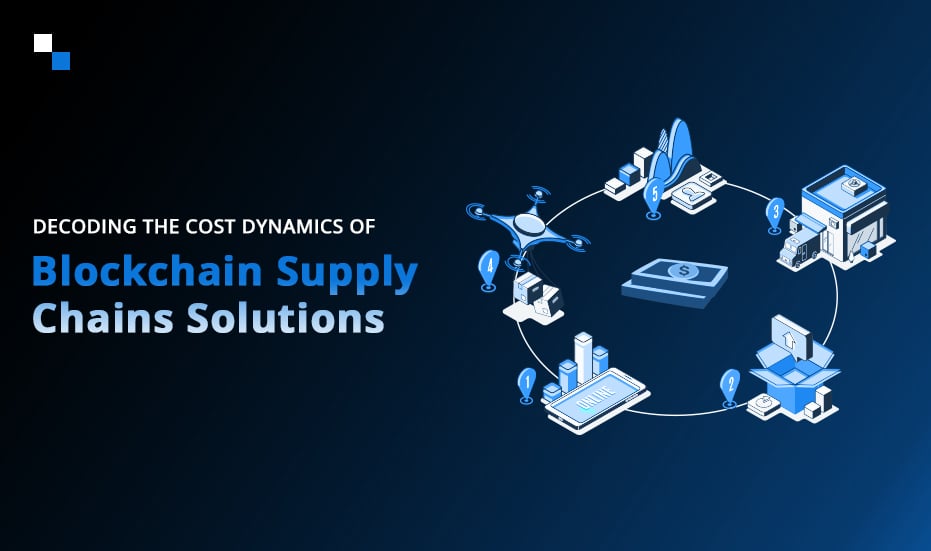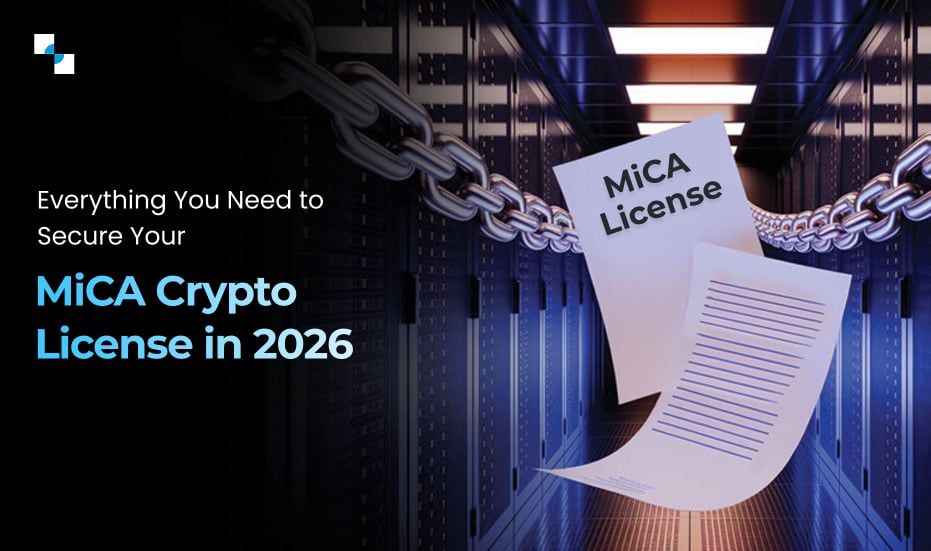The global manufacturing industry has undergone a significant digital transformation in recent years, especially after the introduction of blockchain in this sector. Blockchain, a decentralized and distributed ledger technology, strengthens the manufacturing industries’ supply chain, offering numerous benefits, such as transparency, traceability, efficiency, security, and more, that drive innovation and growth.
According to an IMARC Ground report,
The global blockchain market in manufacturing is projected to grow from USD 3,027.9 million in 2024 to USD 95,576.9 million by 2033, reflecting a compound annual growth rate (CAGR) of 46.8% from 2025 to 2033.”
However, while the growth is clear, another question that often strikes every business owner’s mind is: What is the cost of blockchain supply chain development?
In this blog, we will break down the various factors involved in implementing blockchain in manufacturing supply chains and further analyze the initial and ongoing costs when considering the adoption of this groundbreaking technology.
Why Invest in Blockchain for a Smarter Manufacturing Supply Chain
Before investing in blockchain supply chain development, you might wonder whether this technology is the right choice, especially with ample options available to boost the supply chain efficiency of your manufacturing business. It’s crucial to understand the unique strengths that blockchain offers.
Blockchain, essentially a distributed ledger technology, enables immutable and transparent record-keeping of transactions. In manufacturing supply chains, blockchain can:
- Track materials and products from the source to the final consumer.
- Enhance visibility to reduce inefficiencies, fraud, and errors.
- Streamline processes by eliminating intermediaries.
- Improve trust among stakeholders through real-time access to tamper-proof data.
Factors Affecting the Cost of Implementing Blockchain in Manufacturing Supply Chain
Excellence demands investment, and so does the implementation of blockchain in supply chain manufacturing. Let’s delve into these expenses and factors.
1. Initial Feasibility Study and Consultation
The first crucial step is to conduct a feasibility study before diving into blockchain implementation. During this stage, businesses can engage with blockchain supply chain development consultants or specialists to gain insights into whether blockchain is the right fit to resolve their supply chain challenge.
This step is crucial as it prevents unnecessary expenditure on unsuitable technologies. The estimated cost of this process depends on the supply chain size and complexity, and the expertise of the consultants involved.
2. Blockchain Platform Selection
The choice of blockchain platform significantly impacts cost. Popular platforms like Ethereum, Hyperledger Fabric, or Corda vary in terms of features, scalability, and pricing.
- Public Blockchains: These platforms, like Ethereum, are decentralized and open but can have scalability challenges and high transaction fees, making them less ideal for supply chains requiring high throughput.
- Private/Consortium Blockchains: Platforms like Hyperledger Fabric or Corda are open to selected participants, and offer better scalability and customization, however, come with higher initial development costs and infrastructure requirements.
3. Development and Integration
Custom blockchain manufacturing supply chain solutions development involves smart contract development, integration with existing systems like ERP or CRM, and the development of user-friendly dashboards and interfaces for stakeholders.
The development and integration phase is one of the most resource-intensive steps, as it ensures the blockchain system not only meets specific supply chain requirements but also integrates smoothly with existing processes for maximum efficiency.
4. Hardware and Infrastructure
When it comes to setting up and maintaining the proper hardware and infrastructure for blockchain manufacturing supply chain solutions, it requires-
- Dedicated servers to host nodes to make the decentralized network functional and resilient.
- Networking infrastructure for fast and secure communication between nodes, including high-speed internet, routers, and firewalls.
- High-performance computing resources for validating data and processing complex algorithms involved in consensus mechanisms, often requiring specialized hardware like GPUs or computing clusters.
Investing in these components contributes to the overall cost of implementing blockchain manufacturing supply chain solutions in such environments.
5. Training and Change Management Costs
Training programs and workshops help employees gain the skills required to utilize blockchain manufacturing supply chain solutions to the fullest. On the other hand, effective change management strategies will help employees adjust to the new processes and ensure a seamless transition to the blockchain-based system. This training and change management adds to the overall investment required for the integration of blockchain in manufacturing supply chains.
6. Regulatory Compliance and Legal Costs
Manufacturers must adhere to data protection laws like GDPR and CCPA to safeguard sensitive information in blockchain systems. Compliance requires ensuring that personal data is processed lawfully, securely, and transparently. To meet these requirements, manufacturers may need to hire legal experts who specialize in data protection regulations. It also contributes to the overall cost of developing blockchain manufacturing supply chain solutions.
7. Ongoing Maintenance and Updates
Ongoing maintenance and updates also drive up the cost of running a blockchain network in several ways.
- Regular security updates require resources, such as developers and testing infrastructure, to identify vulnerabilities and deploy fixes.
- Addressing scalability issues often involves investing in advanced technologies like layer 2 solutions or upgrading hardware to handle increased traffic, which can be expensive.
- Performance monitoring tools and analytics also add to the operational cost as it require dedicated infrastructure and staff to analyze data and identify inefficiencies.
8. Transaction Costs
Transaction costs play a significant role in the overall cost structure of implementing blockchain in manufacturing supply chains.
In public blockchains, transaction fees fluctuate based on network congestion and demand, often increasing during peak usage. This can lead to higher costs for users who need to prioritize their transactions. On the other hand, private blockchains generally have lower transaction costs, as they operate in a controlled environment with fewer users and less congestion.

Conclusion
The cost of implementing blockchain in manufacturing supply chains varies depending on factors such as complexity, scale, and desired features. While the initial investment can be significant, the benefits of enhanced transparency, traceability, and efficiency make it a worthwhile endeavor for manufacturers aiming to stay competitive in an evolving market.
By starting with a clear strategy, leveraging existing platforms, and collaborating with an experienced blockchain development company, Antier, businesses can optimize costs and reap the long-term rewards of the technology.
Antier is a reliable blockchain development company you can trust for developing end-to-end blockchain solutions to streamline the supply chain operations of manufacturing. Backed by 700+ skilled blockchain engineers, Antier empowers startups and enterprises with business-oriented solutions that help digitize their supply chains while reducing operational costs and unlocking opportunities.
Book a free consultation to discuss your blockchain supply chain development needs!
FAQs
How long does it take to develop a blockchain manufacturing supply chain solution?
The development timeline varies based on project complexity and can range from 3 to 12 months.
Is it necessary to hire professionals for blockchain supply chain development?
Yes. Hiring experienced blockchain developers and consultants is essential to design, develop, and implement a secure and efficient system.
Can small and medium-sized businesses afford blockchain manufacturing supply chain solutions?
Yes. We at Antier have expertise in creating scalable and modular solutions that cater to the needs and budgets of small and medium-sized businesses.
Is integrating blockchain with existing ERP systems expensive?
Integration with ERP systems like SAP or Oracle can be costly, depending on the compatibility and extent of customization needed.
Does blockchain supply chain development require ongoing updates?
Yes, as supply chains evolve, blockchain systems may require updates to smart contracts, integrations, and features, which adds to the ongoing cost.







